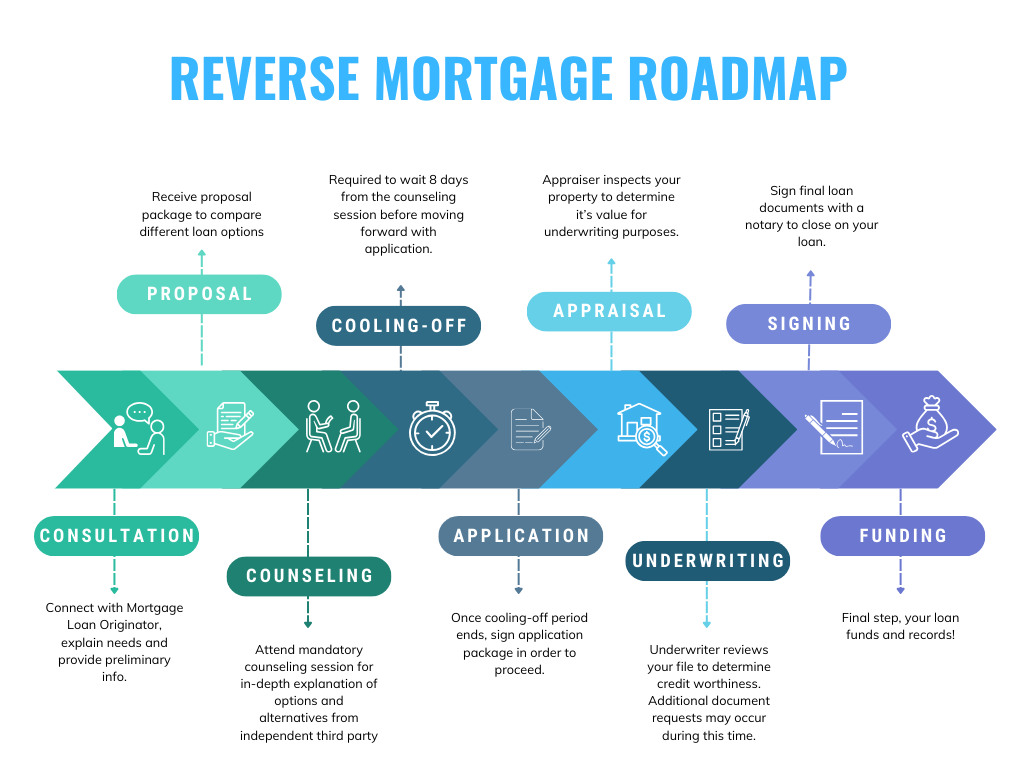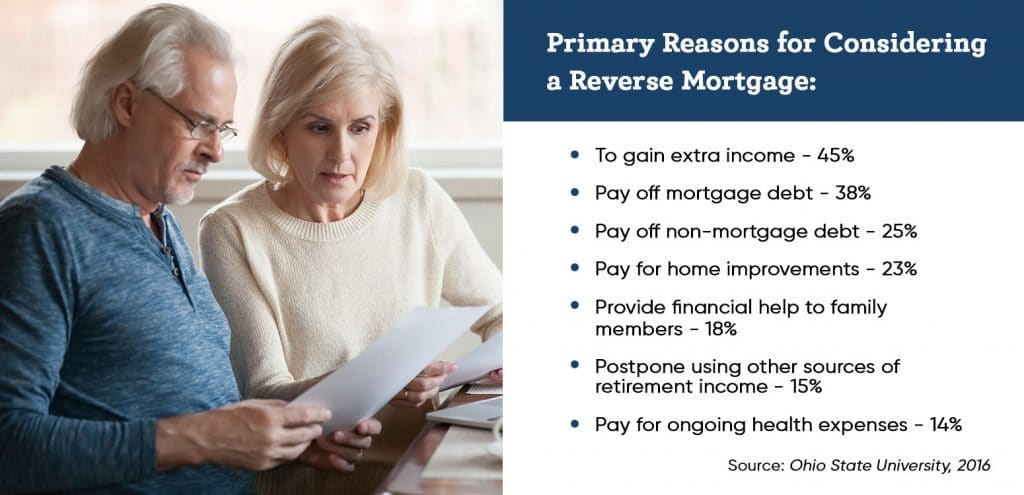Step-By-Step: How to Purchase a Reverse Home Loan With Self-confidence
Navigating the complexities of buying a reverse mortgage can be complicated, yet a systematic approach can equip you to make informed decisions. It begins with assessing your eligibility and understanding the nuances of various financing choices offered in the market. Involving with trusted loan providers and comparing their offerings is critical for securing favorable terms. Nevertheless, the procedure does not end there; cautious focus to paperwork and compliance is crucial. As we check out each action, it becomes obvious that self-confidence in this financial choice depends upon comprehensive prep work and notified options. What follows in this important trip?
Understanding Reverse Mortgages

The key device of a reverse home mortgage includes borrowing against the home's worth, with the financing amount increasing with time as passion accrues. Unlike traditional mortgages, debtors are not needed to make regular monthly payments; instead, the funding is paid off when the property owner offers the residential property, leaves, or passes away.
There are 2 primary types of reverse home loans: Home Equity Conversion Home Mortgages (HECM), which are government insured, and exclusive reverse home mortgages supplied by personal lenders. HECMs commonly supply higher protection due to their regulatory oversight.
While reverse mortgages can provide monetary relief, they also feature prices, including origination fees and insurance premiums. As a result, it is crucial for potential borrowers to completely recognize the terms and effects prior to continuing with this economic choice.
Examining Your Qualification
Eligibility for a reverse home loan is largely figured out by numerous essential factors that prospective debtors need to think about. First and primary, candidates should be at the very least 62 years old, as this age demand is set to make certain that consumers are approaching or in retirement. Furthermore, the home needs to act as the borrower's main home, which indicates it can not be a vacation or rental building.
Another important aspect is the equity position in the home. Lenders usually call for that the debtor has a sufficient quantity of equity, which can impact the quantity readily available for the reverse home loan. Generally, the more equity you have, the larger the financing amount you might get.
In addition, possible customers need to show their capability to fulfill monetary commitments, consisting of building tax obligations, property owners insurance, and maintenance expenses - purchase reverse mortgage. This assessment often consists of a monetary assessment carried out by the lending institution, which examines income, credit score history, and existing debts
Last but not least, the property itself should fulfill certain standards, consisting of being single-family homes, FHA-approved condos, or certain manufactured homes. Recognizing these factors is vital for identifying qualification and planning for the reverse home loan procedure.

Looking Into Lenders
After determining your eligibility for a reverse home mortgage, the next action involves looking into lenders who offer these monetary items. It is essential to identify credible lenders with experience in reverse home loans, as this will certainly guarantee you obtain reliable advice throughout the procedure.
Begin by assessing lending institution credentials and accreditations. Search for loan providers who are participants of the National Opposite Home Mortgage Lenders Organization (NRMLA) and are approved by the Federal Real Estate Management (FHA) These associations can show a commitment to ethical practices and compliance with industry criteria.
Reviewing consumer evaluations and testimonials can provide understanding right into the lending institution's reputation and client service high quality. Websites like the find out Bbb (BBB) can additionally supply rankings and issue backgrounds that may help inform your decision.
Additionally, seek advice from monetary consultants or real estate therapists who concentrate on reverse mortgages. Their know-how can assist you browse the options available and advise credible loan providers based upon your special monetary scenario.

Comparing Finance Alternatives
Comparing loan choices is a critical step in protecting a reverse mortgage that lines up with your economic goals. When assessing different reverse mortgage items, it is important to think about the specific functions, prices, and terms connected with each choice. Beginning by assessing the type of reverse mortgage that finest matches your needs, such as Home Equity Conversion Home Loans (HECM) or proprietary fundings, which might have different eligibility criteria and benefits.
Following, focus on the interest rates and fees related to each financing. Fixed-rate car loans provide stability, while adjustable-rate options may offer lower initial prices yet can vary over time. In addition, think about the upfront costs, including home loan insurance coverage premiums, source charges, and closing prices, as these can considerably impact the total expenditure of the finance.
Additionally, assess the settlement terms and just how they line up with your long-lasting economic approach. Recognizing the implications of just how and when the funding should be paid back is important. By thoroughly comparing these elements, you can make an educated choice, ensuring your choice sustains your monetary wellbeing and offers the safety and security you seek in your retired life years.
Completing the Purchase
When you have actually thoroughly evaluated your options and picked one of the most appropriate reverse home mortgage product, the following step is to finalize the purchase. This procedure involves several vital actions, making sure that all essential documentation is precisely completed and sent.
First, you will require to collect all called for documentation, consisting of proof of earnings, real estate tax statements, and property owners insurance policy documents. Your loan provider will give a list of particular files required to help with the approval procedure. It's critical to supply complete and precise details to stay clear of delays.
Following, you will undertake a comprehensive underwriting process. Throughout this phase, the lending institution will certainly analyze your economic circumstance and the value of find out this here your home. This may consist of a home assessment to identify the residential property's market worth.
When underwriting is full, you will certainly receive a Closing Disclosure, which describes the last regards to the funding, including charges and rate of interest. Review this paper very carefully to guarantee that it straightens with your expectations.
Verdict
Finally, browsing the process of buying a reverse home loan requires a comprehensive understanding of qualification criteria, thorough research on lending institutions, and cautious comparison of finance options. By systematically following these steps, people can make educated choices, ensuring that the selected mortgage straightens with monetary goals and demands. Eventually, a well-informed strategy promotes self-confidence in protecting a reverse home loan, offering economic security and assistance for the future.
Look for loan providers who are members of the National Reverse Mortgage Lenders Organization (NRMLA) and are approved by the Federal Real Estate Administration (FHA)Contrasting funding choices is a crucial action in safeguarding a reverse home loan that aligns with your financial objectives (purchase reverse mortgage). Begin this link by examining the type of reverse mortgage that finest matches your requirements, such as Home Equity Conversion Home Mortgages (HECM) or proprietary loans, which might have different qualification requirements and benefits
In final thought, navigating the procedure of buying a reverse home mortgage calls for a detailed understanding of eligibility criteria, thorough research study on lending institutions, and careful comparison of financing choices. Ultimately, a knowledgeable strategy fosters confidence in protecting a reverse home mortgage, offering monetary stability and support for the future.